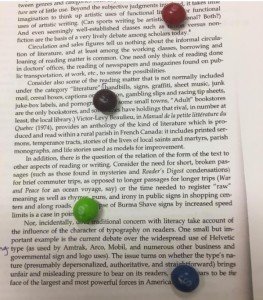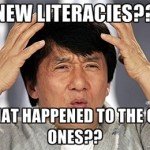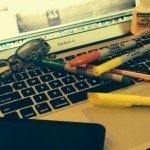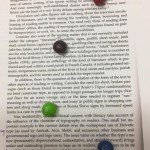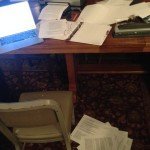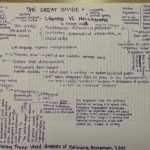
Ethnographic vs. Ethnocentric: An Attempt at Understanding Literacy Things
Literacy is full of dichotomies. As someone who’s new to literacy studies, it’s been difficult to decide which nuanced perspectives to agree with.
Maybe I’ll write my way to some kind of clarity.
Literacy theories generally exist on a continuum between ethnographic and ethnocentric. The most clear example of an ethnocentric theory being the “Great Divide,” where literacy is argued to be the reason that people rise to civilization from barbarity. Of course, educated scholars who have only known what it means to be literate and to participate in literate cultures where reading and writing have value would say their way is the right way. However, oral cultures are equally complex with their emphasis on memorization and language being used directly in context–they don’t have to worry about autonomy in their language because it exists only in the here and now. The observation of these oral cultures and what it means to be literate in them favors an ethnographic approach to understanding literacy–an approach concerned with social purpose, context, and community.
I favor an ethnographic or social approach to literacy studies because I don’t see literacy functioning or being understood properly outside of the context it’s written for. Even global literacies (literacies being shared digitally around the world or physical literacies (like a t-shirt with words) from one place being used by another) aim to localize themselves. This is evidenced by sites like reddit; it might be open to everyone, but it has subreddits to create communities with shared interests. Some of those communities are even exclusive, requiring a prospective participant to ask the moderators of a subreddit to join. This exclusivity demonstrates the importance of a sense of community and suggests global communities are interested in localizing themselves. Facebook is another example–people try to create a network of friends and family across the world, localizing their previously local communities globally. However, there are still options to make some posts available only to some people and ways to block those who aren’t really in your community (a feature whose use has been elevated by the recent presidential election). Again, the exclusivity and selectiveness within the platform aspires to create a local community with shared interests over a global network.
This is to suggest we don’t like it when literacy exists outside of our community. We don’t favor unsituated literacies, this is why we tend to block peoples’ posts on Facebook when those posts contain distasteful opinions that bring themselves closer to their ideal community and distance themselves from those who fall outside of their ideal community. For example, I just looked at Facebook and found my brother-in-law shared the image below.
Knowing who shared the image, I know the idea in the image (I’m assuming it regards Caitlyn Jenner) is an idea he actually has and will express to bond with those who share his idea. However, if I sent the image to my brother (who’s currently in South Korea) without any context, he would instantly understand I’m criticizing it and condoning the sentiment. This supports the idea that the same literacy can be repurposed without explanation and it will be understood based on who participates in the local community. Localization to situate a literacy is important–we all have communities that will understand a certain literacy differently based on the ideals of that community.



